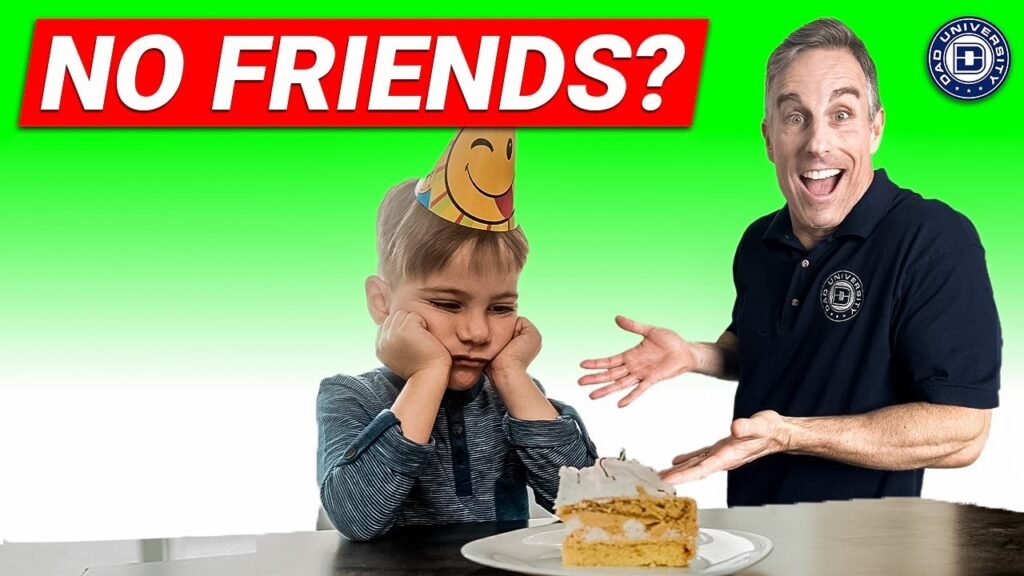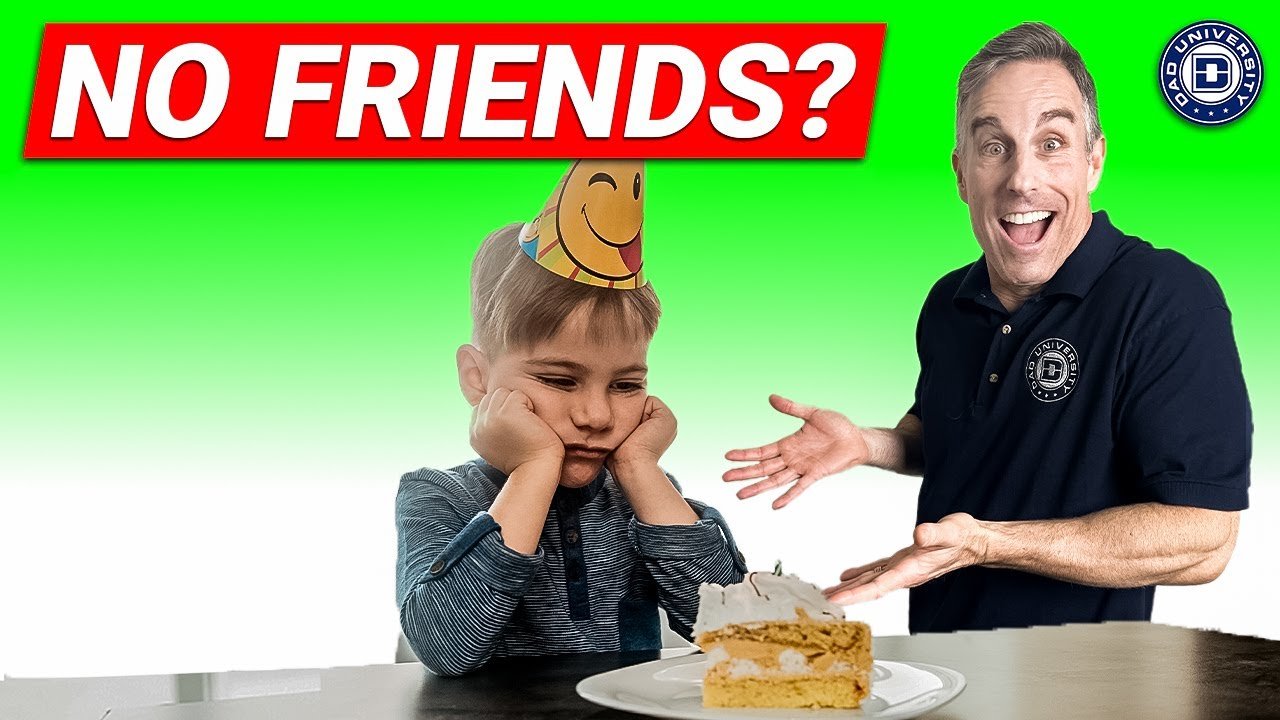Hey guys! If your child is having trouble making friends or doesn’t seem to have any friends, or if you’re just interested in them being more social, there are specific things you can do to help your child build those social connections. I’m Jason Kriman, the founder of Dad University, and in this video, I’m offering some tips to help your children make friends. Now, keep in mind that the age of the child is a factor. If your child is four or under, it’s totally normal for them to not play with other kids or just play side by side. They don’t really have an understanding of what friendship is yet. However, if your child is in grade school or older, here are some things you can do to help them build some connections. First, talk to your child openly about their feelings and experiences with friendships. Ask them if they’re having trouble with specific social situations or if there are any issues at school or in their activities. If there are issues, those need to be addressed specifically. Second, respect their pace. It’s essential to respect your child’s pace and ease them into social situations if they’re uncomfortable. Don’t avoid it, but gradually expose them to social situations. Don’t push too hard. Third, promote empathy. Understand that while something might be really easy for you, like making friends and going to parties, it may be really difficult for your child. Be empathetic about the situation. Also, teach them about empathy. For example, if a classmate of theirs may be having a party and they don’t want to go, you can explain that being empathetic means putting yourself in the place of their classmate. Ask them how their classmate would feel if they said they were going to the party but then didn’t show up. We aren’t responsible for other people’s feelings, but we do need to teach our kids to have empathy for others. Finally, encourage interests and hobbies. Help your child find activities, hobbies, or even sports that they can participate in. This can be a great way to meet like-minded children and other kids who share the same interests. Whether it’s a club, a camp, or even a team, these are some great ways to meet other kids. Remember, making friends is a gradual process, so it can take some time. Be patient and continue to provide support and encouragement for your child. Building social skills and fostering friendships is an essential aspect of their growth and development. I’d love to hear from you. Have you attempted to foster friendships for your child? What’s worked and what hasn’t? Leave your feedback in the comment section below.
Open Communication
Talk to your child about their feelings
One of the first steps in helping your child build social connections is to have open and honest communication with them. Take the time to ask your child about their feelings regarding friendships. Are they struggling to make friends? Are there any specific social issues they are facing? By listening to their thoughts and experiences, you can gain valuable insight into their challenges and concerns.
Address specific social issues
Once you have started a conversation with your child about their feelings, it’s essential to address any specific social issues they might be facing. Whether it’s bullying, exclusion, or difficulty in social settings, these issues need to be acknowledged and discussed openly. By doing so, you can provide guidance and support tailored to their unique situation.
Respect Their Pace
Gradually expose them to social situations
It’s crucial to respect your child’s pace when it comes to social interactions. While it can be tempting to push them into situations where they may feel uncomfortable, it’s essential to ease them into social settings gradually. By doing so, you are showing them that their comfort level matters and that they can navigate social situations at their own pace.
Don’t push too hard
While it’s important to expose your child to social situations, it’s equally important not to push them too hard. Pushing them beyond their comfort zone can backfire and create more anxiety for them. Instead, focus on finding a balance between gently encouraging them to step outside their comfort zone and respecting their boundaries.
Promote Empathy
Understand their difficulties
It’s crucial to understand that what may come easy to you, like making friends or going to parties, may be challenging for your child. Take the time to empathize with their difficulties. By understanding their struggles, you can better support and guide them in developing their social skills.
Teach them about empathy
In addition to understanding their difficulties, it’s essential to teach your child about empathy. Empathy involves putting oneself in another person’s shoes and understanding their feelings. When your child can empathize with others, it becomes easier for them to navigate social interactions with kindness and understanding.

Encourage Interests
Help your child find activities or hobbies
One effective way to help your child build social connections is through their interests and hobbies. Take the time to explore different activities and hobbies with your child. Whether it’s joining a club, participating in a camp, or trying out a new sport, these opportunities can lead to meeting like-minded peers who share the same interests.
Facilitate connections with like-minded peers
Once your child has found an activity or hobby they enjoy, take steps to facilitate connections with like-minded peers. Whether it’s organizing playdates or encouraging social interactions within the activity or hobby, creating opportunities for your child to connect with others who share their interests can greatly enhance their social life.
Playdates
Organize one-on-one or small group playdates
Playdates can be a wonderful way for your child to build social connections. Start by organizing one-on-one or small group playdates with children who your child may feel comfortable around. By keeping the group small, you create a more intimate and less overwhelming environment for your child to engage and interact with others.
Create a comfortable space for building connections
When organizing playdates, be mindful of creating a comfortable space for building connections. Choose activities that encourage collaboration, communication, and fun. Whether it’s a game, a craft project, or simply playing in the park, providing a safe and enjoyable environment can help your child develop their social skills and form lasting friendships.
Role Play
Practice social scenarios through role-playing
For children who are shy or unsure of how to navigate social situations, role-playing can be a helpful tool. Take the time to practice social scenarios with your child through role-playing. Act out different situations, such as approaching someone new or joining a group activity. By doing so, you can show your child what to say or do in those situations, helping them feel more confident and prepared.
Offer a safe environment to develop social skills
Role-playing provides a safe and familiar environment for your child to develop their social skills. By offering a space where they can practice interactions without the fear of judgment or rejection, you are allowing them to build their confidence and learn how to navigate social situations more effectively.
Positive Reinforcement
Acknowledge and verbalize their efforts
When it comes to building social skills, it’s essential to acknowledge and verbalize your child’s efforts, no matter how small. When you see them making an effort to engage with others or practice positive social behavior, take the time to acknowledge it. Verbalize your appreciation for their efforts, letting them know that their actions are valued.
Motivate children to repeat positive behavior
Positive reinforcement plays a significant role in motivating children to repeat positive behavior. By acknowledging their efforts and providing praise, you encourage them to continue making progress in their social interactions. This motivation can help boost their confidence and make them more willing to engage with others in the future.
Community Involvement
Participate in community events or volunteering
Engaging in community events or participating in volunteering activities can provide excellent opportunities for your child to interact with neighbors and other families. These activities not only boost your child’s confidence but also allow them to contribute to their community and make a positive impact. Encourage your child to participate in these events, fostering connections and building social skills in the process.
Boost confidence and connect with neighbors
Community involvement can significantly boost your child’s confidence and help them connect with neighbors. By participating in local events, your child has the chance to meet new people, engage in conversations, and build relationships. These connections can extend beyond the event itself and create a sense of belonging within the community.
Professional Help
Seek guidance from child psychologists or therapists
If you have concerns about your child’s shyness, social anxiety, or other developmental issues, seeking guidance from child psychologists or therapists can be beneficial. These professionals can provide valuable insights and support in addressing any potential underlying issues that may be affecting your child’s ability to make friends. They can also offer strategies and techniques tailored to your child’s specific needs.
Address underlying issues and provide support
Professional help can be instrumental in addressing underlying issues that may be hindering your child’s social development. Through therapy or counseling sessions, your child can receive the support they need to navigate their challenges effectively. By addressing these issues and providing the necessary support, you can help your child build the skills and confidence necessary for forming meaningful social connections.
Conclusion
Building social connections and friendships is a gradual process for children. It requires patience, understanding, and support from parents. By promoting open communication, respecting their pace, encouraging empathy, and facilitating opportunities for engagement, you can help your child navigate social situations with more ease. Remember to provide positive reinforcement, engage in community involvement, and seek professional help when necessary. With your unwavering support, your child can develop their social skills, foster meaningful friendships, and thrive in their social interactions.

